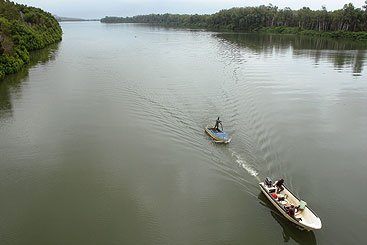Achieving peace through water management

Achieving peace through water management
Future wars may well be fought over scarce water resources, but in the Southern African Development Community that threat is disappearing through transboundary water cooperation.

At the heart of the SADC cooperation, is the philosophy of ‘Ubuntu’, that all people are interconnected, and therefore interdependent.
As human populations and their economies continue to grow, pressure on limited water resources is also bound to grow. Time and again, there has been talk that conflict may erupt over these limited water resources.
Countries in the Southern African Development Community (SADC) region, however, are successfully using transboundary water cooperation as a conflict prevention initiative. The SADC Water Division, supported by the GIZ, serves as a role model for cooperation rather than conflict over scarce water resources using proactive awareness-raising and multi-level collaboration.
The spirit of social justice. At the heart of the cooperation, is the philosophy of ‘Ubuntu’, that all people are interconnected, and therefore interdependent. “Ubuntu is one of the tenets of all cultures in the SADC region and represents a social contract of mutual respect, responsibility and accountability that members of society have towards each other,” says Horst M. Vogel, Programme Leader for GIZ Transboundary Water Management in the Southern Africa Development Community. “Ubuntu defines a process for earning respect by first giving it, and to gain empowerment by empowering others. It encourages social justice for all.”
Leading through collaboration. At the local level, stakeholders can already see this conflict prevention in action. The Kunene Transboundary Water Supply Project is developing and rehabilitating water supply and sanitation infrastructure in southern Angola and northern Namibia for communities and towns along the border region between the two countries. The project benefits each country, but is also having a positive effect on the neighbouring Cuvelai Basin.
The success has been possible through all stakeholders participating in the philosophy of Ubuntu. “The challenge for us in development cooperation, or as temporary guests to the region, has been to first see and comprehend this unique ethical philosophy, which runs counter to our Western system of individualism, and then try to apply it to day-to-day cooperation, to work on the ground,” says Vogel. “Slowly but gradually this fosters trust and mutual understanding, which in turn creates win-win situations and propels cooperation.”
Model of cooperation, not conflict. The Orange-Senqu River Commission, which is cooperating with the ICPDR on several projects and activities, has been involved in an information and study tour exchange programme with the Transboundary Water Management in Central Asia programme, engaged in the establishment of river basin organisations for the Isfara and Khodzhabakirgan Rivers that are shared by Kyrgyzstan, Tajikistan and Uzbekistan. To further share their experiences, SADC has developed a report on conflict prevention and peace dividends through transboundary water management in the SADC region.
For more information or to read the report, please visit the SADC-ICP collaboration portal at: www.icp-confluence-sadc.org






